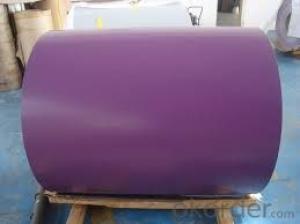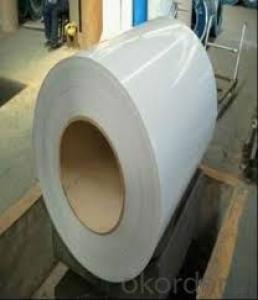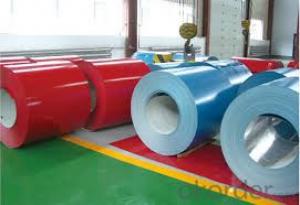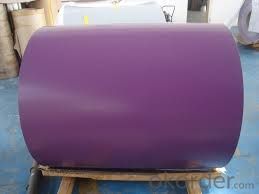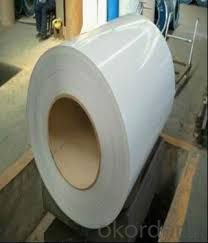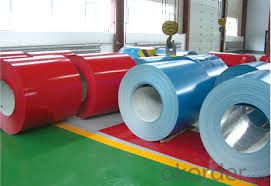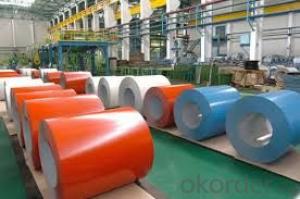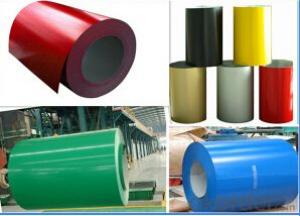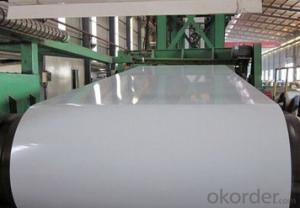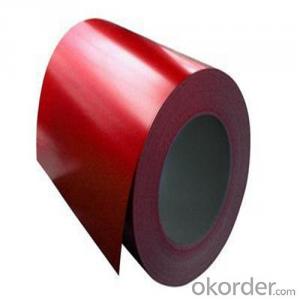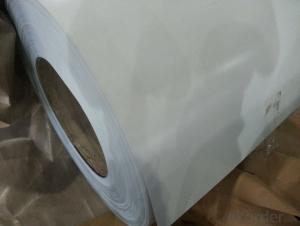Prepainted Steel Coil/PPGI-Prepainted Galvanized Steel
- Loading Port:
- Shanghai
- Payment Terms:
- TT OR LC
- Min Order Qty:
- 20 m.t.
- Supply Capability:
- 18000 m.t./month
OKorder Service Pledge
OKorder Financial Service
You Might Also Like
Product Description
Product Name: China PPGI manufacturer/PPGI MILL
PPGI coils
PPGI steel coils
PPGI galvanized coils
PPGI zinc coated coils
Pre-painted galvanized steel coils
Color coated steel coils
Color coated steel coils
Red color/blue color steel coils
Color coated PPGI FOR metal roof
DX51D color coated corten steel coil(PPGI)
Prime prepainted galvanized steel coil
White color prepainted steel coils
Color steel coil for roofing material
Dx51d+z prepainted steel coil
Colorful galvanized steel coil
Specifications:
Grades: Q195-Q235 and SPCC, SPCD, SPCE, SGCC (DX51D+Z) and SGCD (DX52D+Z)
Thickness: 0.13 to 2.0mm
Width: 600 to 1200mm or customized
Coil inner diameter: 508 to 610mm
Coil weight: Customized
Color: RAL
Surface protection: PE, PVDF, SMP and HDP
Surface treatment: Chromate, oil/un-oil, bright finish, spangle and anti-finger print
Standards: JIS G3302, JIS G3312 and ASTM A653M/A924M 1998
Zinc coating weight: 60 to 275G/M
Features:
Nice corrosion-resistant: Zinc layer provides nice protection of pre-painted galvanized steel sheet
High heat resistant: Reflective surface of material aids in efficiently reflecting sunlight away and turn reducing amount of heat transmitted, thermal reflectivity converts into energy-saving.
Coating adhesive force of color-coated sheet is strong, which keeps color and luster novel for long.
Widely used in such field as architecture, electrical home appliances, furniture, communal facilities, communications and transportation.
PPGI prepainted sheets and coils
Product thickness: 0.135 to 2.0mm
Product width: 760 to 1250mm
Coil weight: 5 to 10 metric tons
Coil ID: 508mm
Coil OD: Max 1500mm
Coating type: PE
Standards: JIS G 3312, ASTM A755M, GB/T 12754, Q/CHG 2-2003, EN 10143, DIN 17162
Material: TDC51D, AZ150, SGCC, CGCC, SPCC195L, TSGCC, CCGI, Q195-Q235, SPCD, SPCE
Color: RAL
Zinc coating: 60 to 275G/M²
Application: Construction, hardware, home appliances, interior decoration and more.
| NAME | PPGI | GALVANIZED | GALVALUME/ALUZINC | |
| CERTIFICATE | ISO9001:2008 | |||
| STANDARD | EN10142 JIS G3302 GB/T-12754-2006 | ASTM A653 JIS G3302 SGCC/SGCH GB/T2518 European Standard | ASTM A792 JIS G3321 JIS G3317 | |
| GRADE | CGCC CGCH CGCD1-CGCD3 CGC340-CGC570 GRADE | SS GRADE33-80 SGCC SGCH SGCD1-SGCD3 SGC340-SGC570 SGCC DX51D | GRADE33-80 SGLCC SGLCD SGLCDD SGLC400-SGLC570 SZACC SZACH SZAC340R | |
| MODEL NO | 0.16MM-1.5MM*1250MM OR UNDER | (0.12-1.5)*1250MM OR UNDER | 0.16MM-1.5MM*1250MM OR UNDER | |
| TYPE | Steel coil Steel sheets/plates Corrugated steel sheets/plates | Steel coil Steel sheets/plates Corrugated steel sheets/plates | Steel coil Steel sheets/plates Corrugated steel sheets/plates | |
| TECHNIQUE | Hot rolled-cold rolled -galvalume /galvanized -PPGI/PPGL | Hot rolled-cold rolled - galvanized | Hot rolled-cold rolled -galvalume /Aluzinc | |
| SURFACE TREATMENT | Mini/regular/big/zero spangle, Chromate treatment /chromate-free treatment /untreated unoile/oiled, TENSION LEVELLERT SKIN PASS anti-fingerprint/un-anti-fingerprint, Coating,color | Mini/regular/big/zero spangle, Chromate treatment /chromate-free treatment /untreated unoile/oiled, TENSION LEVELLERT SKIN PASS anti-fingerprint/un-anti-fingerprint, Coating | ||
| APPLICATION | Structural use ,roofing, commercial use, household appliance, industry, family | |||
| SPECIAL APPLICATION | Wear resistant steel, high- strength - steel plate | |||
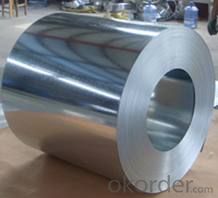
Q&A What is your advantage?
ANSWER:24 hour quick response /Customer oriented/ Credit foremost/ Top quality Excellent
- Q: i have a question on a test and the questions before it are about blast furnace, wrought iron and cast iron...question 16 is..What is Steel?i dont really get what im being asked.. there could be many answers, what answer are they looking for?
- as steel is an alloy i thinkl they are looking for what elements it is made up of
- Q: What are the common quality control measures for steel coils?
- To ensure the performance and reliability of steel coils, several common quality control measures are implemented. These measures play a crucial role in upholding the overall quality of the coils and ensuring their compliance with the necessary standards and specifications. To begin with, dimensional checks are conducted to verify that the steel coils possess the correct thickness, width, and length. Deviations from the specified dimensions can significantly impact the coils' functionality and usability, making this check of utmost importance. Following that, visual inspections are carried out to identify any surface defects or imperfections such as scratches, dents, or corrosion. These inspections aid in identifying potential issues that could compromise the structural integrity of the coils or affect their aesthetic appearance. Moreover, mechanical property tests are performed to assess the strength, hardness, and other mechanical characteristics of the steel coils. These tests provide valuable insights into the coils' performance and durability under different conditions and loads. An essential quality control measure for steel coils is the analysis of their chemical composition. This involves scrutinizing the steel's composition, including the presence of any impurities or elements that may impact its properties. It ensures that the coils are made from the correct grade of steel and meet the required chemical specifications. Coating inspections also play a vital role in quality control. When steel coils are coated with protective layers, it is imperative to examine the adhesion, thickness, and uniformity of these coatings. This examination ensures that the coils have sufficient protection against corrosion and other environmental factors. Lastly, various non-destructive testing methods, such as ultrasonic testing, magnetic particle inspection, or eddy current testing, are employed to detect any internal defects or abnormalities in the steel coils. These tests enable the identification of issues like cracks, inclusions, or discontinuities that may not be visible through visual inspection alone. In conclusion, the quality control measures for steel coils consist of dimensional checks, visual inspections, mechanical property tests, chemical composition analysis, coating inspections, and non-destructive testing. These measures are vital in maintaining the quality and reliability of steel coils, guaranteeing their compliance with the required standards, and meeting customer expectations.
- Q: What are the advantages of using galvanized steel coils?
- Using galvanized steel coils in various applications offers a multitude of benefits. Firstly, their resistance to corrosion is highly impressive. Through the process of galvanization, a protective layer of zinc is applied to the steel, effectively guarding it against moisture, chemicals, and other elements that can lead to rust and corrosion. As a result, galvanized steel coils are an excellent choice for outdoor applications that are exposed to harsh weather conditions or corrosive substances. Secondly, galvanized steel coils boast exceptional durability and longevity. The zinc coating provides an additional protective layer, enhancing the steel's resistance to wear and tear. Consequently, galvanized steel coils have a longer lifespan compared to other steel types, reducing the frequency of replacements and saving costs in the long term. Moreover, galvanized steel coils exhibit remarkable strength and structural integrity. The zinc coating not only offers corrosion resistance but also augments the overall strength of the steel. This makes galvanized steel coils an ideal option for applications that demand a robust and dependable material, such as construction, automotive, and industrial manufacturing. Furthermore, working with galvanized steel coils is effortless and requires minimal maintenance. The zinc coating creates a smooth and uniform surface, facilitating tasks like painting, welding, and fabrication. Unlike other coatings or finishes, galvanized steel coils do not necessitate regular maintenance or additional protective measures, reducing the time and effort required to keep them in optimal condition. Lastly, galvanized steel coils are environmentally friendly. The zinc coating used in galvanization is recyclable, making it a sustainable choice for various industries. Additionally, the extended lifespan of galvanized steel coils diminishes the need for frequent replacements, thereby reducing waste and the overall environmental impact. In conclusion, the advantages of utilizing galvanized steel coils encompass corrosion resistance, durability, high strength, easy workability, low maintenance, and environmental sustainability. These benefits have solidified galvanized steel coils as a favored option in a wide range of applications, spanning from construction and manufacturing to automotive and infrastructure projects.
- Q: What are the dimensions of steel coils used in the construction materials industry?
- The dimensions of steel coils utilized in the construction materials industry may differ based on specific requirements and applications. Nevertheless, there exist some commonly employed dimensions. In this industry, steel coils usually possess a width that spans from 600mm to 2,000mm, with the most frequently observed widths being 1,000mm and 1,200mm. The thickness of these coils can fluctuate between 0.4mm and 2.5mm, with the most commonly adopted thicknesses ranging between 0.6mm and 1.2mm. The inner diameter of the coil, commonly referred to as the core size, can vary from 508mm to 610mm, with 610mm being the predominant core size. Moreover, the weight of these coils can also differ, with typical weights ranging from 3 to 15 tons. It is important to emphasize that these dimensions might alter depending on specific project requirements and can be tailored to suit the demands of a particular construction project.
- Q: But we've had a problem with bears being attracted to the water in the Intex Inflatable pools, the bear would come at night every so often and push on the sides letting out the water.Would a bear be able to bend a steel frame before I go and spend money?
- depends on the steel thickness and positioning. frm your question I'm guessing you're not really well versed in steel framing or use... im guessing whatever you build, a bear can destroy. if i was to build it not even 100 bears can destroy it. it doesn't require much steel, it's just about bracing the positing of steel and some design.
- Q: What are the different methods of steel coil surface cleaning?
- There are several different methods of steel coil surface cleaning, including mechanical cleaning, chemical cleaning, and high-pressure water cleaning. Mechanical cleaning involves using abrasive materials or brushes to remove dirt, rust, and other contaminants from the surface of the steel coil. Chemical cleaning involves using chemicals or solvents to dissolve or remove contaminants from the surface. High-pressure water cleaning uses water jets at high pressures to remove dirt and debris from the surface. Each method has its own advantages and is chosen based on the specific requirements and condition of the steel coil.
- Q: I want an EDC (Every Day Carry) Knife that:~folds~is non-serrated~has a pocket clip~has a blade length of about 4 in. long~is concealable~urban environment friendly~priced around $50What do you suggest? I am currently thinking on purchasing the Cold Steel 4 inch Zytel Ti-Lite.
- Based okorder /
- Q: My uncle got me some new 'Nam style jungle boots at the px at Fort Worth JSB, and he told me that back in Vietnam, they used to issue guys steel sole boots, that had a sole reinforced with a steel plate, as punji stick d-fence. Is this true, it sounds logical, but I can't figure out how a steel plate in the sole would work. My uncle is kind of a BS'er, plus he wasn't even in Vietnam, much less the Infantry, much less combat, but he was in USAF at the time.
- The steel plate in the boot was about 5 cm long and 2 cm wide, it was located in the midsection of the boot sole but did not cover the heel. Prolonged wear, the humidity and soakings eventually caused the steel piece to break out of the mounding in the inside of the boot and cause blisters.
- Q: How are steel coils packaged for shipping?
- Steel coils are typically packaged for shipping by being tightly wound and secured with steel bands or straps. They are then placed on wooden pallets or in steel cradles to ensure stability during transportation. Additionally, protective packaging materials such as plastic or cardboard may be used to prevent damage from moisture, dust, or other external factors.
- Q: What are the common welding defects in steel coils?
- There are several common welding defects that can occur in steel coils during the welding process. These defects include: 1. Porosity: This is characterized by small holes or voids in the weld metal, which are caused by gas entrapment during the welding process. It can weaken the weld and make it more susceptible to corrosion. 2. Lack of fusion or incomplete penetration: This defect occurs when there is inadequate fusion between the base metal and the weld metal, or when the weld metal does not fully penetrate the joint. It can result in a weak or brittle weld. 3. Cracks: Cracks can occur in the weld metal or in the heat-affected zone (HAZ) of the base metal. They can be caused by factors such as high stress levels, improper cooling, or inadequate preheating. Cracks can significantly reduce the strength and integrity of the weld. 4. Undercutting: Undercutting is a groove or depression that forms at the toe of the weld due to excessive melting of the base metal. It weakens the weld and can lead to stress concentration and potential failure. 5. Excessive spatter: Spatter refers to the small droplets of molten metal that are expelled from the welding arc and can land on the surface of the steel coil. Excessive spatter can result in a rough or uneven surface finish and may require additional cleaning or grinding. To minimize these welding defects in steel coils, it is important to ensure proper weld preparation, including cleaning and removing any contaminants from the surface of the steel. Additionally, using the correct welding parameters, such as appropriate heat input and travel speed, can help to minimize defects. Regular inspection and quality control measures can also help to identify and address any defects before they become more serious issues.
Send your message to us
Prepainted Steel Coil/PPGI-Prepainted Galvanized Steel
- Loading Port:
- Shanghai
- Payment Terms:
- TT OR LC
- Min Order Qty:
- 20 m.t.
- Supply Capability:
- 18000 m.t./month
OKorder Service Pledge
OKorder Financial Service
Similar products
Hot products
Hot Searches
Related keywords
